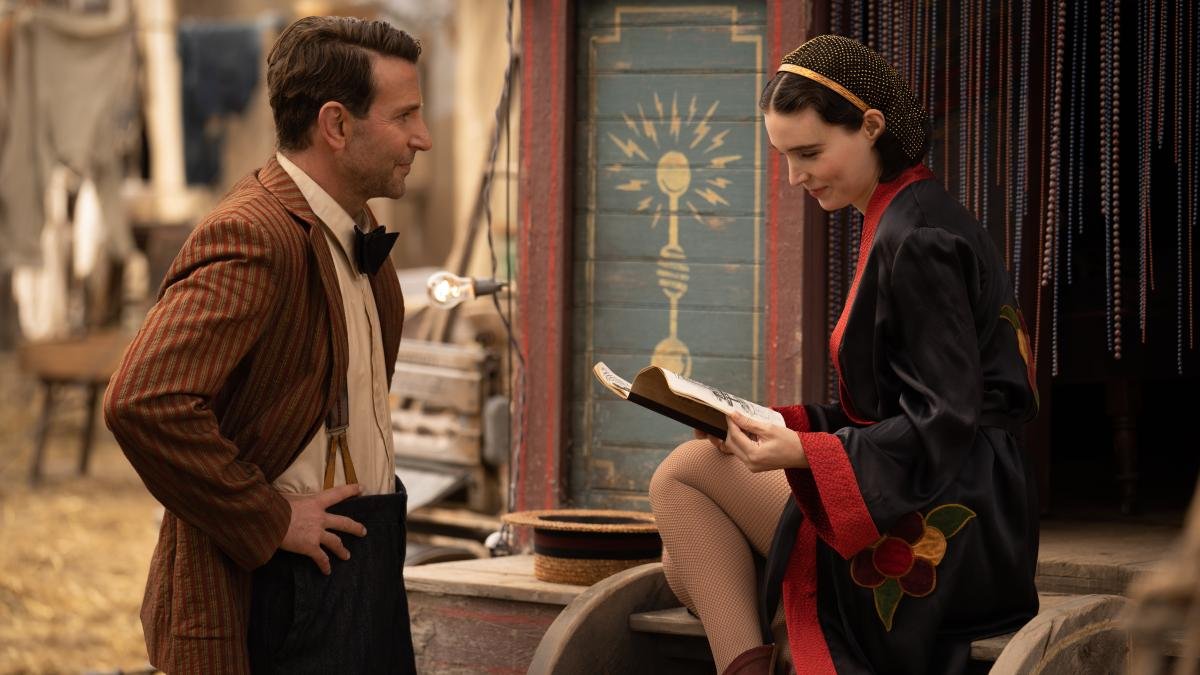Nightmare Alley: Guillermo del Toro's neo-noir thriller is... rather long
Image: Bradley Cooper and Rooney Mara star in Nightmare Alley (2021)
I thought I’d write up a VERY brief review of Guillermo del Toro’s (The Shape of Water, Pans Labyrinth) recent psychological thriller, Nightmare Alley, considering I saw it about an hour ago.
Here we go. . .
I have finally found a movie that I believe contradicts the great reviews I’ve seen thus far on the internet. You know the movies, the ones that have you asking, "Umm did we see the same film?" Before walking into the cinema, I had not read the plot to Nightmare Alley on IMDb and refused to watch the trailer whilst going down on a delicious choc top during the previews of House of Gucci last week. Safe to say, I was genuinely excited to see Nightmare Alley since it starred a stellar, A-list cast, headlined by heartthrob Bradley Cooper. Cooper stars as Stanton Carlisle, a mysterious drifter who ends up working at a carnival run by Clem Hoately, played by the incredible Willem Dafoe. Throughout the film, we follow Carlisle as he swindles his way to the top as a mentalist in New York. However, sixty minutes in and I began to feel like a carnival attendee strapped to the seat of a Ferris wheel and unable to get off – to be honest, I contemplated jumping.
Don’t get me wrong, the visuals are gorgeous, from set design to costuming and hair and makeup. Not to forget the superb acting with the likes of Cate Blanchett playing the glamourous psychiatrist Dr Lilith Ritter; Rooney Mara as Molly, the sweet ‘Electric Girl’ and lover of the Coops (Bradley); and Toni Colette as the clairvoyant Zeena; all of whom carry the film through a dense and sometimes tedious plot.
But why oh why was it so bloody long? Do filmmakers not realise that theatres don’t always have soft, cushiony recliner seating with service attendants at the click of a button, ready to reheat your popcorn during Act Two or massage your aching buttcheeks during the climax of Act Three? Come to think of it, the last three films that I have seen in the cinemas have been around the 2 1/2 hour timeframe – Dune, West Side Story, and House of Gucci. Perhaps the length of films are getting longer due to the need to create a more 'cinematic experience' with on-the-go, 'clickbaity' television and low-budget films being produced at rapid rates for competing streaming platforms (but that's a topic for another day).
Now, I have nothing against long films, I loved Dune and West Side Story (House of Gucci, ehh) but these films were engaging. I was mesmerised by the plots, the character arcs, and everything in between. It made sense for them to play out over 2 1/2 hours. Any less and I’d be left feeling disappointed. Nightmare Alley, on the otherhand, felt as though it could have been summed up in an hour and a half, two hours tops. Whilst the plot’s trajectory was realistic (Carlisle and Mary eventually move on from the carnival), this meant the film moved away from the loveable characters we had just spent the first half of the film getting to know: the eccentric and kind, Zeena (Toni Colette) and carnival boss-man, Clem (Willem Dafoe).
Cate Blanchett stars alongside Cooper as the mysterious psychiatrist, Dr Ritter
Apart from what is bound to be an award-winning production design, I also commend the film for its originality and unpredictability (Nightmare Alley is based on the 1946 novel of the same name by William Lindsay Gresham, so despite not being completely original, del Toro has done a great job at revising an old story in a very Guillermo-esque way for audiences today). Just as I thought the film would go one way, it diverged. Leaving me guessing what would happen by the denouement. Not to mention the eerie score and neo-noir cinematography, both of which capture a sombre and rather depressing 1940s America where life was strenuous, grimy, built on the working class and those hustling for a brighter future.
From a filmmaker’s viewpoint, the film does have its commending qualities; however, as a moviegoer looking for an entertaining psychological thriller on a Wednesday night, I felt that it was all over the shop (as is the way with many novel adaptations). I left the cinema with a sore derriere and an urgent need to relieve myself after holding in a large Pepsi over what seemed a lifetime.
I’d love to know what you think. Am I the only one not quite understanding something about the film here? Or was this one of those movies that just didn't suit me?
★★☆☆☆


